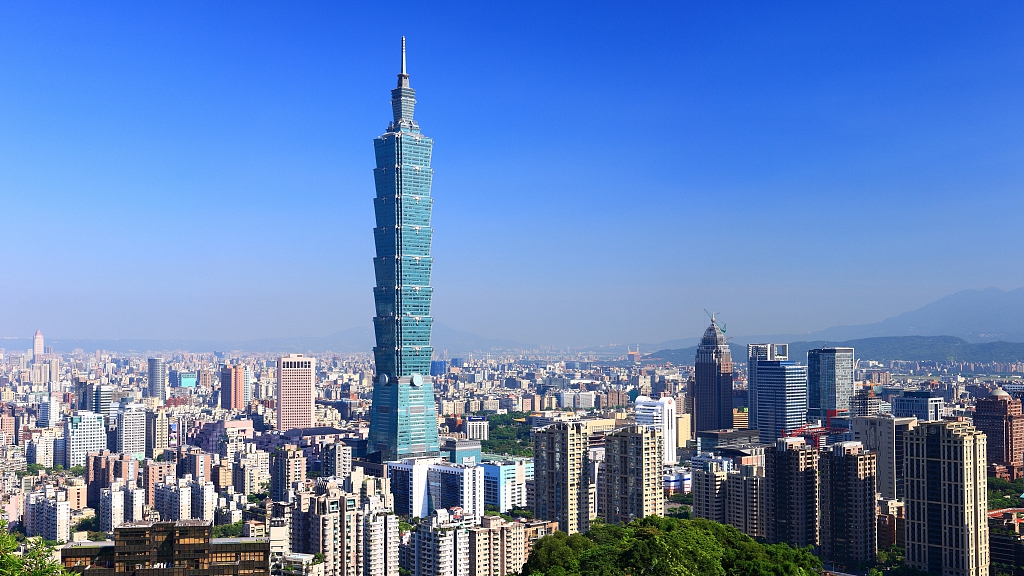
The Taipei 101 skyscraper commands the urban landscape in Taipei, Taiwan.[Photo/Xinhua]
In their telephone talk on Jan 17, Chinese President Xi Jinping told then US president-elect Donald Trump that the Taiwan question concerns China's national sovereignty and territorial integrity, and he hoped that the US side would handle it with caution.
A message Chinese Foreign Minister Wang Yi stressed again in his first talks with US Secretary of State Marco Rubio, by telephone, one week later.
Taiwan has been an integral part of China's territory since ancient times, and Beijing will never allow Taiwan to be separated from the motherland, said Wang, stressing that the US has made solemn commitments to the one-China principle in the three China-US joint communiques and should not go back on its word.
Ever since Trump won the 2024 US presidential election in November, the Chinese side has taken advantage of various channels and opportunities, including through imposing sanctions on dozens of US weapon manufacturers that have sold arms to the island, to emphasize its firm stance on the Taiwan question, which is China's internal affair.
However, as the readout of the US Department of State on the Wang-Rubio call indicates — in which Rubio stresses the US' "commitment to our allies in the region and serious concern over China's coercive actions against Taiwan and in the South China Sea" — the messages from Beijing seem to have fallen on deaf ears.
The new US administration is still sticking to strategic ambiguity regarding the Taiwan question. A stance based on the so-called Taiwan Relations Act, a public law enforced in 1979 upon the founding of diplomatic relations between Washington and Beijing, that the US has adhered to ever since.
But while that ambiguity is becoming increasingly incapable of enabling Washington to butter the two sides of the bread at the same time, the US administration is still reluctant to discard the "Taiwan card".
So even while Trump openly demands the island pay more for its "defense" and complains about Taiwan exploiting the US in the advanced semiconductor industry, the US continues with its provocations related to Taiwan.
In its latest move, two US ships, the destroyer USS Ralph Johnson and the oceanographic survey ship USNS Bowditch, passed through the Taiwan Strait from Monday to Wednesday, the first such move since the Trump administration took office about 20 days ago.
As Chinese People's Liberation Army Eastern Theater Command spokesperson Li Xi said, the US side should realize that its actions "sent the wrong signals and increased security risks".
Washington should realize that there is only one correct stance on the Taiwan question for the US — and any other country having diplomatic ties with Beijing — and that is to uphold the one-China principle.
Guo Jiakun, a spokesperson for the Foreign Ministry, reiterated that China firmly opposes any country's provocations and threats to its sovereignty and security in the name of freedom of navigation.
The PLA Eastern Theater Command tracked and monitored the two US ships, and it remains on high alert at all times to resolutely safeguard China's sovereignty and national security, as well as regional peace and stability. The US administration should heed Rubio's remark in a Congress hearing shortly before taking office that "the costs of intervening in Taiwan are too high". The PLA will not allow any external force to play with fire on the Taiwan question.
Notably, the Taiwan authorities have recently finalized a new missile agreement with the US worth $761 million to acquire three surface-to-air missile systems. Although the deal was approved in October under the then president Joe Biden, it will be the first of its kind under the Trump administration if it goes ahead. That will deal a heavy blow to the nascent trust that has been delicately built between the two sides thanks to the guidance of the heads of state diplomacy.
As the Sino-US relations stand at a new beginning, it is high time the Trump administration discarded the US' strategic ambiguity over the Taiwan question and honored its commitments under the three communiques, which will give a strong boost to the healthy development of Sino-US relations.